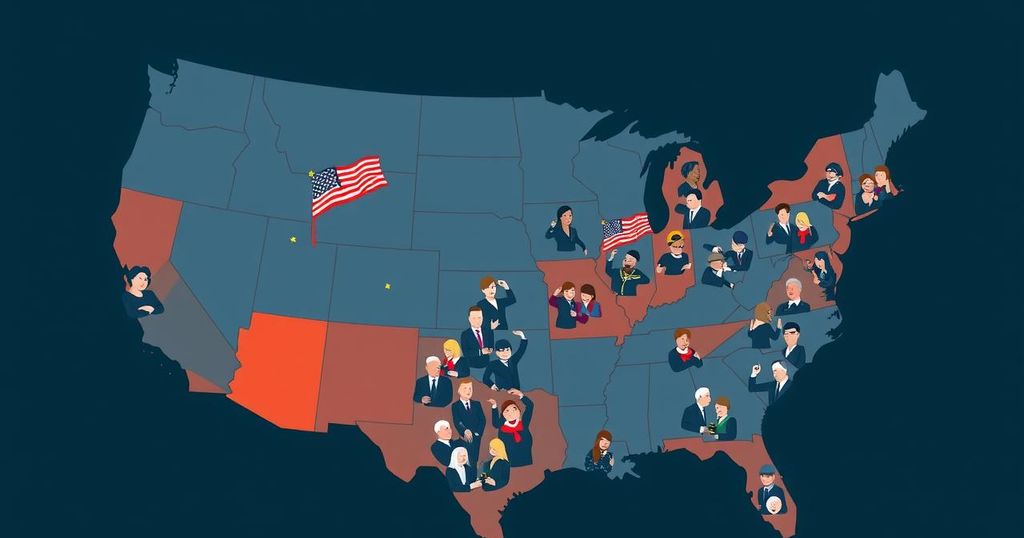US Presidential Candidates Align with Global Shift Towards Stricter Immigration Policies

The article explores the shift towards stricter immigration policies among US presidential candidates, with both Trump and Harris adopting rightward stances reflecting broader global trends. As concerns rise over far-right influence, experts warn of the implications for asylum rights and the normalization of nativist rhetoric. The political narrative around immigration represents a significant departure from previously held humane policies and has been met with bipartisan criticism.
In recent political discourse regarding immigration, a disquieting narrative has emerged, characterized by alarmist rhetoric concerning immigration as an invasion. Former President Donald Trump has consistently emphasized a defiant approach to immigration, promising to undertake the “largest deportation operation in the history of the United States” and advocating for stringent border control measures. Trump has portrayed undocumented immigrants as threatening, stating, “They will enter your home and cut your throat.” As the presidential race intensifies, experts have observed a discernible shift among political parties, both liberal and conservative, toward a more right-leaning stance on immigration policy, mirroring a global trend. In tandem with Trump’s nativist rhetoric, Vice President Kamala Harris has also committed to enforcing stricter immigration rules, including the hiring of thousands more border agents, a shift from her previous stances that raised concerns among immigrants’ rights groups. The growing discourse on immigration reveals a broader acceptance of far-right perspectives on the issue that have infiltrated mainstream politics. Petra Molnar, a specialist in migration and human rights, pointed out the shift, stating, “There’s a spectre of being overrun by ‘the other’ that has always been there… it seems to have filtered into the entire conversation around immigration.” Historically, the politicization of immigration fears is not a novel occurrence in the United States. For instance, in 1992, Pat Buchanan made headlines by decrying illegal immigration as an invasion, a view that was met with alarm within the Republican Party at the time but has resonated more broadly in recent years. This evolution in viewpoint has contributed to an alarming reduction in the protections historically afforded to asylum seekers, with a common belief that leniency in asylum policies could lead to increased immigration. This trend is not confined to the United States; it extends into Europe where similar sentiments are echoed in countries like France, Germany, and the United Kingdom. For example, the nativist Reform UK Party recently gained significant traction by advocating for a freeze on immigration, while in Germany, the far-right Alternative for Germany (AfD) party recently made historical electoral gains. Amid these developments, mainstream parties are increasingly adopting hardline stances in an effort to counter the far-right’s influence, with the French government, under President Emmanuel Macron, implementing stricter immigration policies as a response to the rightward shift. The urgency surrounding immigration has become a pressing issue in the upcoming US elections, with immigration rated highly among voter priorities. Polls indicate that immigration is viewed as a critical concern following a surge in border crossings under President Biden’s administration. In a significant pivot from his campaign promises to restore protections for asylum seekers, Biden’s policies have increasingly mirrored those of his predecessor, Donald Trump, maintaining strict immigration controls and limiting the capacity for asylum requests. Harris has continued this rightward trajectory on immigration, promising even stricter policies than those currently in place, which has led to concerns regarding the deterioration of vital asylum rights. Critics underscore the challenge of advocating for a more humane immigration policy within the prevailing narrative that frames immigration as a threat. Judith Sunderland from Human Rights Watch asserted, “When you allow the far-right to frame this issue… it becomes very difficult to have a conversation about the benefits of migration.” Overall, the evolving landscape of immigration policy reflects a troubling reality where once-fringe ideas have gained considerable ground, leading to a convergence among major political parties towards more restrictive immigration measures.
The article discusses the contemporary global shift in immigration policy, particularly as it pertains to the United States, where both Republican and Democratic parties are adopting stricter stances on immigration amidst rising far-right influence. Citing specific instances of political rhetoric from prominent figures such as former President Donald Trump and current Vice President Kamala Harris, the article explores the implications of such perspectives on humanitarian policies and the treatment of asylum seekers. It examines historical parallels and offers insight into the broader political trends influencing these policies across various nations.
The political climate surrounding immigration has seen a notable shift towards more restrictive policies across the political spectrum, spurred by the normalization of far-right rhetoric in mainstream discourse. As both Trump and Harris embrace tough immigration stances, the traditional protections for asylum seekers are increasingly jeopardized. This prevailing narrative not only places severe constraints on immigrants but also complicates discussions about the contributions of migration to society and the moral obligations owed to those seeking refuge.
Original Source: www.aljazeera.com








